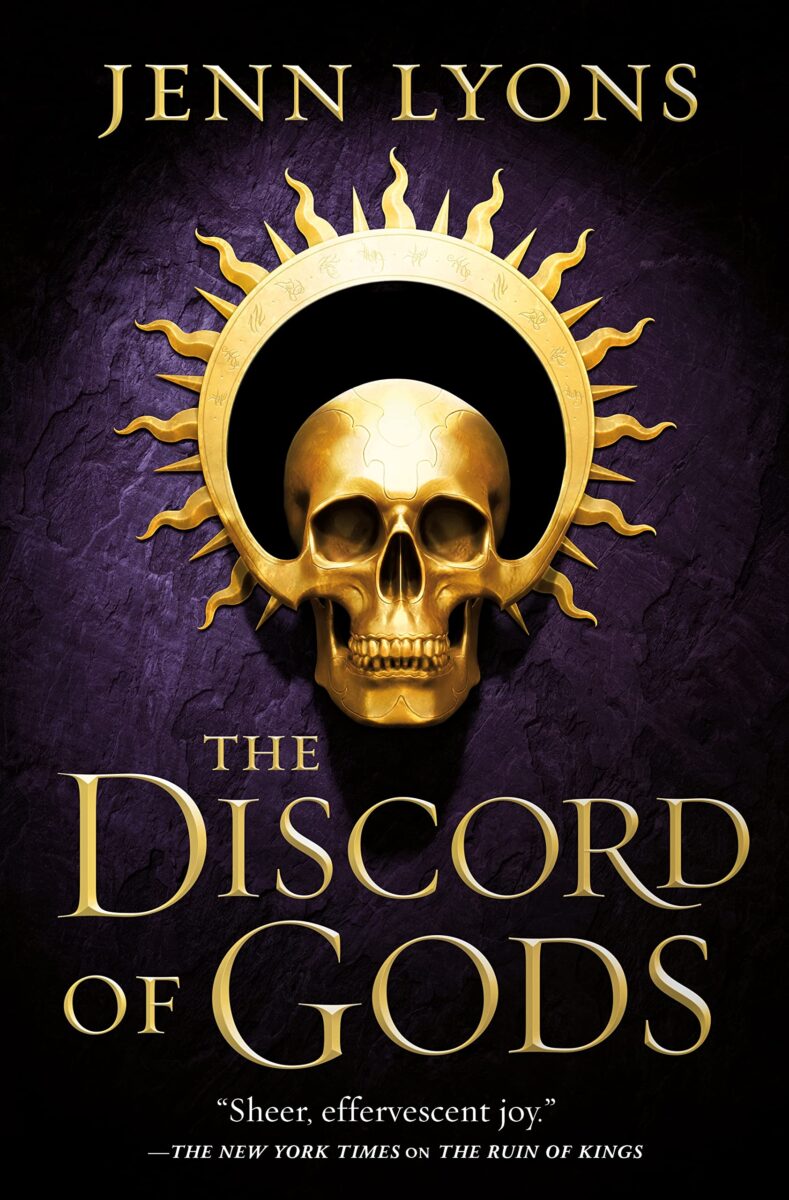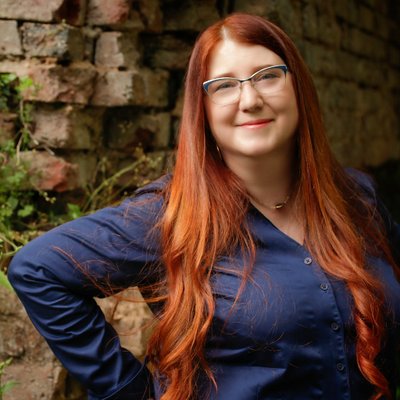All good things must come to an end. It’s a cliché because it’s true, but less cliché is the truth that not all good things come to a good end. Fantasy buffs know all too well the disappointment of loose ends and failed character arcs. Therefore, fantasy buffs—rejoice! For The Discord of Gods is an ending so action-packed, so character-intense, and so utterly intent on outdoing every book that’s come before that it boggles the mind. How can Jenn Lyons possibly fit everything into one last book? But she does. And then some.

Things were looking grim for our heroes as of the last book, The House of Always. Kihrin had merged with his world-devouring second self, the Quuros Empire was fracturing along provincial, gender, and class lines, Xaltorath was still on the loose, and Relos Var was still very much in control of what was going on. Also, several literal gods were dead, the sun was still in the process of dying, and nobody knew what demons were, much less how to stop them from rampaging across the continent.
In The Discord of Gods, things somehow get even worse.
Quur isn’t just fracturing, it’s in open civil war. Emperor (or Empress? I don’t think that got solved) Tyentso is holding things together by a thread, but Kihrin begins this story by imposing on her complete lack of time by requesting her involvement. Apparently, there are bigger issues than an empire starving or being overrun by rebels who think that women aren’t fit for leadership. (That one hit close to home, but Lyons also gave us some dark wish fulfilment in the ways that Tyentso cleaned house.) Tyentso is understandably skeptical, as are some of the other allies being called in. What could possibly be more important than widespread famine and war?
The scale, though, has steadily increased over the course of the series, so that we already know the answer. Tyentso is dealing with an empire; Kihrin is dealing with a whole universe. That can be a lot to process, and Lyons make some thought-provoking points about dismantling empires. Is there a just or bloodless way to end imperialism? What happens after the revolution—who provides the food and cleans the streets, how does the world become better? So many fantasy books are about bringing down the Dark Lord, and too many simply replace one monarchy with another. Why can’t we invent worlds that imagine more?
But these huge questions and conflicts remain rooted in the personal stories of our ever-expanding cast of characters. It’s a good way to keep the narrative engaging, and it’s particularly good for this story because Lyons is also asking questions about how empires go bad in the first place. The problem is people. Even the most brilliant scholar or the most charismatic leader will have human failings, and unchecked, individual flaws like jealousy, greed, or narcissism are sufficient to ruin the world. Systems can be bad, but at their heart it’s because people act badly.

Fortunately, the solution is also people. Compassion, self-sacrifice, and cleverness can meet the challenge. Whether goodness can win is the big question, but Lyons is wisely not asking whether goodness can win against evil. She’s asking if goodness can win against badness. I’m not quibbling here: Tolkien and all subsequent imitators very firmly told us that good wins against the abstract (if personified) essence of capital-E Evil, the kind of evil that comes from outside of humans. Lyons is focused on the kind of evil that is innate to us, the selfish, petty impulses that make people jealous of their siblings or apathetic toward their children or indifferent to the suffering of a stranger. Kihrin and his friends can fight evil all day long, but have they matured enough, have they overcome their own issues enough, to cope with badness? All I can say is that I like the answers The Discord of Gods provides.
There’s another author who produces massive, complex tomes at a breakneck pace, and at this point a comparison diminishes neither party. So I will say that there is a lot in the Chorus of Dragons series for the (many, many) fans of Brandon Sanderson to enjoy. Astonishingly deep worldbuilding undergirds every book, the magic is unlike anything else, and the characters are both badass and fun.
Sanderson likely asks himself “what’s the coolest thing someone could do?” with regard to his action sequences. Lyons seems to have instead asked herself “what’s the coolest thing someone could feel?” Every confrontation carries an immense emotional weight, and Lyons doesn’t hesitate to drop it on you.
This isn’t to say that people don’t do extremely cool things in the Chorus of Dragons, or that Sanderson doesn’t have emotional insight. Rather, the authors are interested in taking different aspects of the same awesomeness to different logical extremes. Lyons has set up intergenerational trauma, cultural conflict, and interpersonal issues so deep they transcend reincarnation. Addressing that is huge, and Lyons makes very sure she gives each character the space to have that confrontation. Sometimes those battles are physical—there is one sequence so insane that I can still only babblingly exclaim gods! Versus dragons! to myself. Other times, the battles are just two people yelling at each other, confronting sins that have driven their characters for five books. Galen in particular has a moment that I am still thinking about, and while it involved exactly one punch, it was equal to the biggest set pieces.
But the fury and satisfaction of confrontation is only part of the smorgasbord of feelings, since Lyons also shows us love and devotion to put the hatred to shame. The central throuple of Kihrin, Janel, and Teraeth is as adorable as ever, Talea and Xivan (my personal OTP) are badass and sweet as can be, and…well, the list goes on. Sanderson books are also very chaste. Lyons’ books are not. They are so entirely, extremely not, and seeing such incredible representation really makes my heart sing.
But it’s not just the romantic couples that make this book shine. Kihrin’s relationship with Tyentso is still a remarkable feat given where they started from in Ruin of Kings, and Sheloran and Galen are still an incredible team. Even the more tenuous relationships, like crappy parents Therin and Khaeriel, develop and provide some catharsis as everyone tries to put their differences aside in order to save the world.
The ending is complete but not tidy. There are some losses, all of which are deeply felt. There are some unfinished threads, but they leave open the tantalizing possibility of follow-ups. None of this diminishes how satisfying everything is. Without spoiling too much, I will only say that there’s a beautiful moment of full circle plotting to really tie the final book with the first.
This has been an incredible series. It had inspired several of us at Geeky to start a podcast specifically so that we could talk more about these books, and it has inspired me personally to go bigger and wilder in my writing and my roleplay campaigns. It’s been an amazing ride, and while I’m sad to see it end, I’m so glad to see it end so well. And I can’t wait to see what Jenn Lyons will do next.
